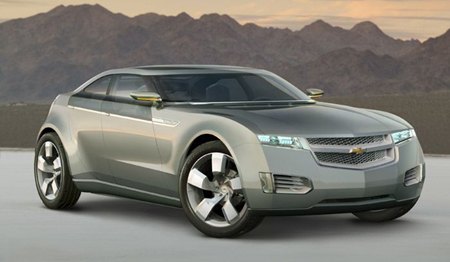Volt Birth Watch 106: 100 MPG Or Bust, Pt. 2
As we reported in our last exciting episode, a big, fat EPA rating on the Volt’s hood is crucial to the project’s success. The LA Times reports that the Volt’s vehicle-line director Tony Posawatz now claims that the EPA has “agreed to a testing method that will produce a rating of at least 100 mpg.” The EPA says it still needs time to determine a fair testing method for plug-in models that burn no gas in their initial EV range. But GM wants it done soon, dammit. Posawatz says The General would share mileage data from the Volt’s onboard computers to verify real-world performance if the EPA would grant the certification now. Posawatz estimates the Volt’s theoretical EPA rating at 120 mpg to 200 mpg, “depending on assumptions about how much gasoline is consumed after the battery loses its charge on the road.” Meanwhile, Don Foley of the Automotive X-Prize would like to remind everyone that “reliance on an mpg standard alone will soon be outdated and will not accurately reflect the need for higher fuel efficiency.” Word. The X-Prize’s mpge (miles per gallon equivalent) is a far better measure of energy use. Hey! Why isn’t GM entering the Volt in the $10m competition? Maybe the EPA mpg standards are easier to game.
More by Edward Niedermeyer


































Comments
Join the conversation
Don't forget the inherent inefficiency in generating electricity. With well over half the energy burned to generate "Volt" fuel wasted in its production and transmission, plus whatever inefficiencies are present in the Volt itself, this type of car will not do anything to trim energy use nationally. Perhaps less imported oil, but certainly more coal. Nice dirty to mine, dirty to burn coal. No free lunch.
golden2husky : September 29th, 2008 at 9:01 pm Don’t forget the inherent inefficiency in generating electricity. This is assuming we stay on the coal/gas/oil generating platform Assume we have to build more generating plants to create the new need for electricity for cars. This is not true because the need will be off hours capacity. This we already have but people are using this as an arguement. We just build wind turbines that will generate electricity. Then the arguement comes what happens if the wind does not blow. Well we generate hydrogen from h20 with surplus wind energy (maybe we build 120% of needed increase) and store it in liquid form. When the wind doesn't blow we use hydrogen turbines to create the electricity. Hygdrogen burns clean but somebody will still have a problem with this. Simple?
When GM recently released the Chevrolet Volt I saw one claim that it would return 150 mpg. I could not think how they could possibly claim such a high mileage per gallon, since the engine is not connected directly to the wheels, but runs through a generator+battery+electric motor. Even if the engine runs at a constant speed corresponding to its maximum efficiency of say 30% (versus 15% under variable speed), the addition of the generator+battery+electric motor (in)efficiencies could only result in an overall improvement in fuel consumption of perhaps +50%. Then I suddenly realized how they were going to claim such "astronomic" miles per gallon! All they had to do was to play on the overall range of the test (EPA tests correspond to relatively short simulated distances e.g. City: 11 miles Highway: 10 miles). Let's take some example figures (just rough assumptions to make the following calculations simpler): Electric autonomy: 40 miles Fuel economy of engine when battery autonomy is depleted: 80mpg Using these figures we can now claim the following (if we deliberately mix-up electrical & gas consumption): Range: 40 miles Fuel economy: infinite mpg (40miles/0gallons) Range: 80 miles Fuel economy: 160mpg (80miles/0.5gallons) See how easy it is to choose the fuel consumption claim you like!!! Following the same logic a range of 60 miles gives 240mpg and a range of 50 miles gives 400mpg. AMAZING!!!!